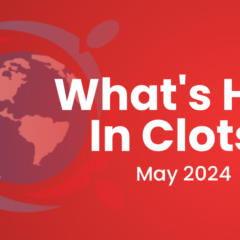Last updated on
Research Report: The PEPPER Trial
Blood clots are part of the risk that any patient takes when they undergo surgery, but the risk is especially high for those who undergo hip or knee replacement surgery. These surgeries are highly susceptible to blood clots because they impact the bone marrow cavity. Bone marrow fat gets into the body and can cause the body to create blood clots, which can then cause pulmonary embolism if they travel from the legs into the lungs.
In order to deal with the problems that blood clots pose, many patients are put on blood thinners to stop the clotting. While this solves the problem of blood clots, it poses another: bleeding. This can cause major health concerns for patients.
Surgeons and their patients have to balance the risk of blood clots forming with the risk of bleeding. A new study, “Comparative Effectiveness of Pulmonary Embolism Prevention after Hip and Knee Replacement (PEPPER),” hopes to help by uncovering which blood thinner on the market is the best to use after hip and knee replacement.
Finding the Right Blood Thinner
Over the span of five years, the PEPPER trial will work with 25,000 patients across 25 sites in North America, who are undergoing elective total hip or knee replacements. Each trial site will randomly create three groups of patients, with each group receiving a different treatment. These treatments include low-intensity warfarin, aspirin, and rivaroxaban.
While all three of these drugs are approved treatments for preventing blood clots during surgery, one challenge the trial has faced is drug prices. The price of treatment varies greatly between the three different options. For example, patients on aspirin incurred almost no cost, but patients on rivaroxaban have varying copays. Some patients have insurance that covers the entire cost of the drug, while other patients face copays that soar to over $100. PEPPER has tried to minimize the cost for patients by using the federal preferred purchasing programs for pharmaceuticals
“A week doesn’t go by without me on the phone or emailing to try and get someone their rivaroxaban,” said Dr. Vincent Pellegrini, the PEPPER trial’s principle investigator, John A. Siegling Professor, and chairman of the Department of Orthopaedics at the Medical University of South Carolina College of Medicine. “If it’s just impossible and we can’t lower their copay cost we end up putting them in a different arm of the trial, which is methodologically imperfect.”
A Trial Driven by Patients
The PEPPER trial is unique because it is a patient-driven study. It is funded by the Patient-Centered Outcomes Research Institute (PCORI). PCORI is a nonprofit organization focused on empowering patients and their caregivers to make better healthcare decisions. They fund research that offers patients the information they need.
Within hip and knee replacement surgery, Dr. Pellegrini found that there was a mismatch in patients’ and doctors’ concerns. Primary care physicians were concerned with patients developing PE, while surgeons were more concerned about the risk of bleeding during surgery. Patients surveyed by Dr. Pellegrini showed varying results, with different groups worried about both PE and bleeding risk.
“That’s what fueled the grant. PCORI is all about patient perceived outcomes and what matters to patients,” said Dr. Pellegrini. “So PCORI was really interested in pragmatic clinical trials looking at established treatments. All of the treatments we’re studying are guideline approved. There’s nothing experimental about them. We just don’t know which one is best.”
“It’s about aligning the goals and incentives of the patient with the treating physician and the operating surgeon, because everyone has a little bit of a different idea about what the other one wants. This is going to be a wonderful exercise in trying to have all of the parties understand what the other parties want from the treatment.”
Through working with a patient advisory board, patient input has had a dramatic effect on the PEPPER trial. At one point in the trial, researchers were considering including pneumatic compression devices in the trial. They wanted to test mobile pneumatic compression devices in order to see how usable they were. The patient advocacy board was quick to point out that they would rather take medications than have to wear cumbersome devices for several weeks.
“To us, it did not seem like a big inconvenience because there’s no complications related to wearing these devices, but there’s a great deal of inconvenience related to the device. The patient advocacy board, quite astutely, was concerned that having these devices incorporated into the trial would compromise enrollment,” explained Dr. Pellegrini. “Right out of the gate the patient advisory board had a very substantial impact on the trial, because we scrapped the idea and stuck with the original plan.”
“What makes the PEPPER trial so unique is the involvement of patients on the patient advisory board and their representatives on the steering committee,” said Kathryn Mikkelsen, a member of the PEPPER trial’s steering committee. “Historically, patients were only involved in research as subjects, and were not involved in the ‘behind the scenes’ planning and decision making of clinical trials. This new level of patient involvement is very exciting because it’s giving patients a voice and makes sure the research addresses the questions and concerns most relevant to them.”
Looking Forward
The PEPPER trial will be a study that helps patients get the best possible treatment when they receive hip or knee surgery. The trial will offer important insights into each medication, sparking important conversations between doctors and patients about what medication is best for the patient as an individual.
“No matter what this trial shows, it’s going to be helpful,” remarked Dr. Pellegrini. “If we show that there’s a ‘winner,’ then…everyone will use the best drug and we will all be better off. If it turns out that there is no ‘winner’ and the three different drugs have different effectiveness profiles in different groups of patients, then our value will be in defining which groups of patients are most appropriate for which groups of drugs.”
If you are interested in learning more about the PEPPER trial visit: https://www.pepperstudy.org



